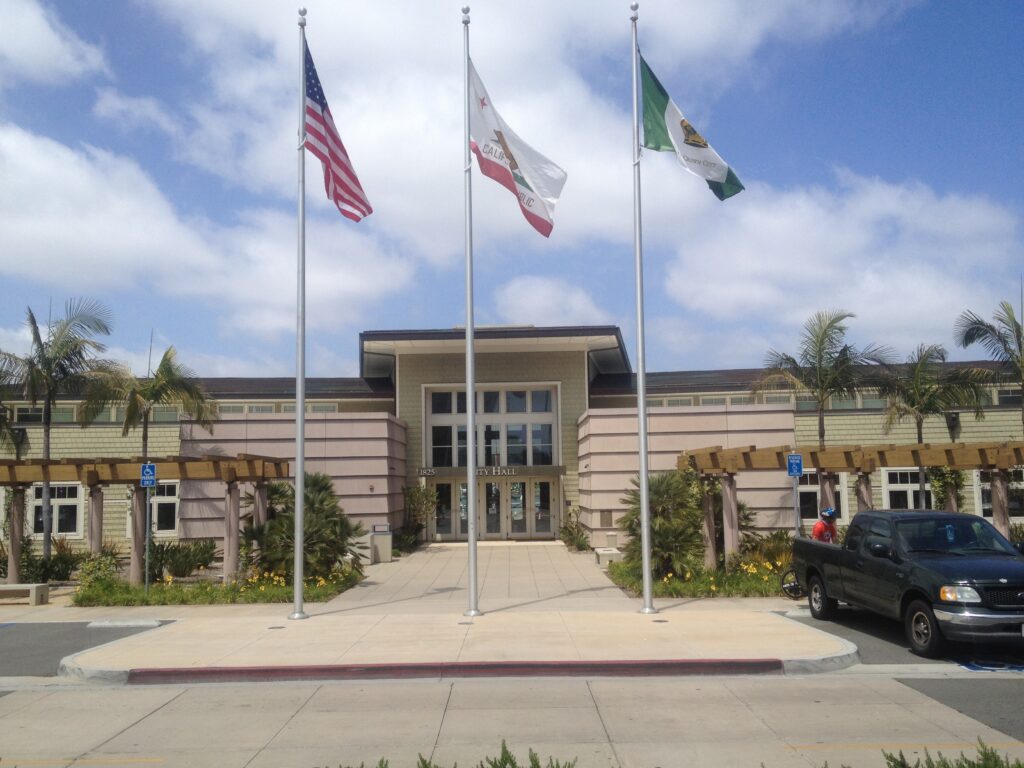
Bicycle-related issues dominate the city council agenda for September 15 meeting. The council will reconsider striping streets with bicycle lanes and whether to increase fines for infractions committed by bicyclists as a way to improve compliance and safety.
There will also be reports from the city manager, the port commission and the citys representative to the San Diego Regional Airport Authority.
Striping streets with bicycle lanes was discussed at the councils September 1 meeting at the request of Councilman Richard Bailey. At that meeting, the council didnt vote on the merits of discontinuing the project, only to put bicycle lane striping on the agenda for further discussion and a vote.
Still, a number of residents from Olive Avenue attended the September 1 meeting to support Baileys request. Most argued that installing buffered bike lanes would not make their street safer and suggested that moving the stop signs on Olive would better protect bicyclists, drivers and pedestrians.
The idea behind the markings was to improve safety for pedestrians, bicyclist and motorist alike by slowing vehicular traffic, not just accommodating bicyclists, the staff report asserted.
Striping was to take place when the streets were slurry sealed. The sealing process is done on rotating basis to extend the life of the pavement. It also fills in minor cracks before they become potholes, and helps maintain skid resistance.
Pavement markings are repainted at the same time. This year the city planned to include bicycle lanes, buffered bicycle lanes, and sharrows (shared lanes).
The city council approved adding bicycle lanes to streets scheduled for slurry sealing at its July 21 meeting. Work was to begin on Olive Avenue on September 14 on Olive Avenue. Plans were to added buffered bike lanes and to convert existing angled parking to back-in angled parking.
Other streets scheduled for bicycle striping this year are:
- Alameda Blvd: buffered and non-buffered bike lanes on Alameda, except the stretch between Third and Fourth Streets; between First and Ocean: bicycle lanes
- Tenth Street (between Alameda and Orange): bike lanes
- I, J and Orange Avenues: sharrows (shared bike lanes) between First and Third Streets and along Second and Fifth Streets.
- Second Street: (between Alameda and Orange): sharrows
- Fifth Street: sharrows
- Avenida Lunar: sharrows
Residents of these streets were notified between March 17 and April 21, 2015.
The city staff sent out 1,300 letters explaining available options for bicycle markings and requesting feedback, the staff report said. It also posted an online survey to assess public opinion.
One hundred and ninety four people responded to the online survey. The majority supported the striping. Only residents on I Avenue and Avenida Lunar objected to striping on their street.
Besides striping the city council will also discuss implementing scheduled fines for traffic infractions committed by bicyclist: a $50 fine for the first infraction, a $100 fine for the second and $250 for the third in a 12-month period.
The list of infractions include: Failure to obey a traffic direction issued by a police officer; failure to yield to pedestrians on sidewalk; riding side-by-side in a bike lane; riding a bike on the sidewalk in the business district or in other locations where it is prohibited.
The City of Davis implemented a similar plan in 2013 and has since seen a 14% reduction in bicycle-related collisions. If the fine schedule is adopted Coronado would be the second city in the state to implement one.
Before recommending the fine schedule city staff the city staff considered other ways to improve compliance among bicyclists by education or diversion.
Diversion programs offer traffic violates the opportunity to take a class instead of paying a fine. Drivers cited for moving violations often opt to attend driver school not only to avoid paying a hefty fine, but also to keep their auto insurance rates from being raised.
Both compliance approaches proved untenable. Management and oversight issues prevented a partnership with the school district. The State of California prohibits cities from establishing diversion programs for adults.
The California Vehicle Code does allow cities and communities to set up a fine scheduled as long as it doesnt exceeded existing fine, penalty and court assessment charges.
The city council meeting will be held at the council chambers on 1825 Strand Way at 4pm.




